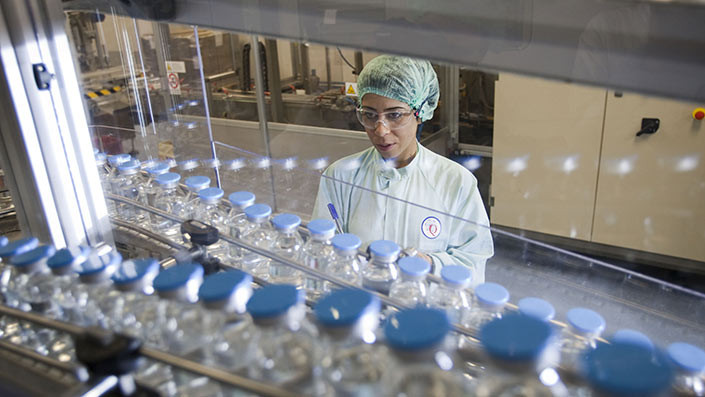Bristol-Myers Squibb (BMS) has agreed to acquire MyoKardia for $13.1 billion cash, the companies said today, in a deal designed to expand the buyer’s cardiovascular drug portfolio with a potential blockbuster for a form of chronic heart disease, for which MyoKardia announced positive Phase III pivotal data in May.
Mavacamten (MYK-461) is an oral, allosteric modulator of cardiac myosin being developed initially for symptomatic, obstructive hypertrophic cardiomyopathy (HCM). BMS said it planned to submit an NDA for mavacamten for the treatment of symptomatic obstructive HCM to the FDA in the first quarter of 2021.
That NDA will be based upon on data from the Phase III EXPLORER-HCM trial (NCT03470545), in which mavacamten met its primary endpoint of positive clinical response 30 weeks after treatment compared with placebo, as well as all secondary endpoints—all with statistical significance, according to MyoKardia. Mavacamten led to meaningful improvements in symptoms, functional status, and quality of life, as well as reduction or elimination in obstruction of the left ventricle, according to topline data MyoKardia reported in May, and was well tolerated.
Mavacamten is designed to reduce cardiac muscle contractility by inhibiting excessive myosin-actin cross-bridge formation that results in hypercontractility, left ventricular hypertrophy, and reduced compliance.
“The acquisition of MyoKardia further strengthens our portfolio, pipeline and scientific capabilities, and is expected to add a meaningful medium- and long-term growth driver,” BMS board chair and CEO Giovanni Caforio, MD, said in a statement.
Mavacamten could generate as much as $2.5 billion in sales by 2026 in its initial indication of obstructive HCM, Wedbush analyst David Nierengarten told CNBC.
Additional indications
In announcing its acquisition of MyoKardia, BMS said it planned to explore developing mavacamten for additional indications that include non-obstructive HCM, as well as develop MyoKardia’s pipeline of novel compounds, including two clinical-stage candidates:
- Danicamtiv (formerly MYK-491), an oral small molecule, selective cardiac myosin activator being developed for genetic dilated cardiomyopathies (DCM). Last month, MyoKardia dosed its first patient in a Phase II trial assessing danicamtiv in people with primary DCM thought to be caused by genetic mutations of the sarcomere.
- MYK-224, a small molecule HCM candidate that advanced last year into the Phase I portion of a Phase Ib/IIa trial (NCT03447990) designed to evaluate the drug’s safety, tolerability and pharmacokinetics in 52 healthy volunteers. MYK-224 selectively targets cardiac myosin, with the aim of normalizing contractility and filling.
Mavacamten joins BMS’ cardiovascular drug portfolio, which includes Factor Xia inhibitors for thrombosis and other vascular events—and is now anchored by the oral anticoagulant Eliquis® (apixaban), which generated $4.804 billion in product revenue during the first half of this year, up 21% from January–June 2019.
By strengthening its cardiovascular portfolio, BMS can offset revenue it expects to lose in coming years.
The pharma giant’s top-selling product is now the cancer drug Revlimid– (lenalidomide), which it inherited when it acquired Celgene for $74 billion last year. Revlimid generated $5.799 billion in product revenues during the first half of this year—up 9.2% from $5.309 billion in the first half of 2019 under Celgene—but expected to shrink further in 2022 when it begins to lose U.S. patent exclusivity.
BMS’ third best-selling drug overall, and second-best selling cancer treatment, is Opdivo® (nivolumab), whose first half product revenue of $3.419 billion is 6% below that of a year ago, as the cancer immunotherapy continues to lag behind arch-rival Merck & Co.’s Keytruda® (pembrolizumab), which racked up $6.672 billion, up 36% from $4.903 billion in January–June 2019.
Complementary strengths
“Together, our complementary strengths and expanded resources and reach will further accelerate the pace at which we can discover, develop and commercialize our novel medicines for the benefit of people suffering from cardiovascular disease around the world,” stated MyoKardia CEO Tassos Gianakakos.
BMS said it expects the acquisition of MyoKardia to add to its non-GAAP earnings starting in 2023, while “minimally” reduce its non-GAAP earnings per share (EPS) in 2021 and 2022. Bristol Myers Squibb reaffirmed its existing 2021 non-GAAP EPS guidance range, which it raised in August from $6.00 to $6.20 per share, to $6.10 to $6.25 per share. The company’s GAAP EPS guidance range, however, was lowered to between ($0.06) and $0.09 per share, from $0.37 to $0.57 per share.
A subsidiary of Bristol-Myers Squibb will commence a tender offer to acquire all outstanding shares of MyoKardia’s common stock for $225.00 per share in cash—a 61% premium above Friday’s closing price of $139.60 per share. MyoKardia’s Board of Directors has unanimously recommended that MyoKardia shareholders tender their shares.
The deal is subject to customary closing conditions which include the tender of a majority of the outstanding shares of MyoKardia’s common stock and the expiration or termination of the waiting period under the Hart-Scott-Rodino Antitrust Improvements Act of 1976.
Upon successful closing of the tender offer, BMS will acquire all remaining shares of MyoKardia that are not tendered into the tender offer through a second-step merger at the same price of $225.00 per share.
BMS said it expected to finance the acquisition with a combination of cash and debt.
“Our companies share a commitment to innovation and bold science, and our respective strengths will help us realize the value inherent in this portfolio,” Caforio added. “We have long admired MyoKardia and what they have done to revolutionize cardiovascular treatments through a precision medicine approach. We look forward to welcoming their talented team to our company.”


